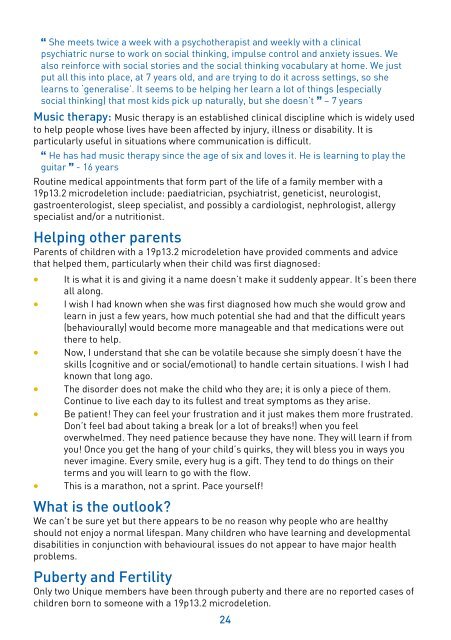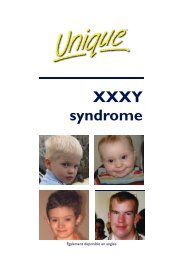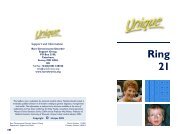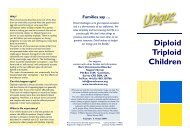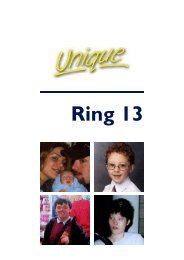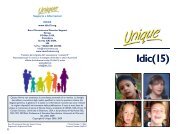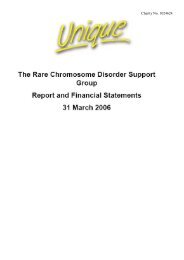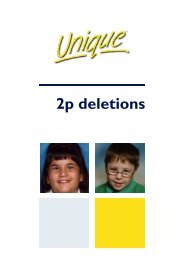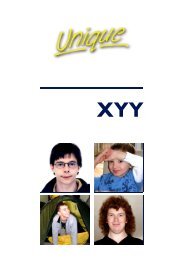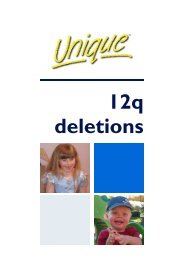19p13.2 microdeletions - Unique The Rare Chromosome Disorder ...
19p13.2 microdeletions - Unique The Rare Chromosome Disorder ...
19p13.2 microdeletions - Unique The Rare Chromosome Disorder ...
You also want an ePaper? Increase the reach of your titles
YUMPU automatically turns print PDFs into web optimized ePapers that Google loves.
She meets twice a week with a psychotherapist and weekly with a clinical<br />
psychiatric nurse to work on social thinking, impulse control and anxiety issues. We<br />
also reinforce with social stories and the social thinking vocabulary at home. We just<br />
put all this into place, at 7 years old, and are trying to do it across settings, so she<br />
learns to ‘generalise’. It seems to be helping her learn a lot of things (especially<br />
social thinking) that most kids pick up naturally, but she doesn’t – 7 years<br />
Music therapy: Music therapy is an established clinical discipline which is widely used<br />
to help people whose lives have been affected by injury, illness or disability. It is<br />
particularly useful in situations where communication is difficult.<br />
He has had music therapy since the age of six and loves it. He is learning to play the<br />
guitar - 16 years<br />
Routine medical appointments that form part of the life of a family member with a<br />
<strong>19p13.2</strong> microdeletion include: paediatrician, psychiatrist, geneticist, neurologist,<br />
gastroenterologist, sleep specialist, and possibly a cardiologist, nephrologist, allergy<br />
specialist and/or a nutritionist.<br />
Helping other parents<br />
Parents of children with a <strong>19p13.2</strong> microdeletion have provided comments and advice<br />
that helped them, particularly when their child was first diagnosed:<br />
<br />
<br />
<br />
<br />
<br />
<br />
It is what it is and giving it a name doesn’t make it suddenly appear. It’s been there<br />
all along.<br />
I wish I had known when she was first diagnosed how much she would grow and<br />
learn in just a few years, how much potential she had and that the difficult years<br />
(behaviourally) would become more manageable and that medications were out<br />
there to help.<br />
Now, I understand that she can be volatile because she simply doesn’t have the<br />
skills (cognitive and or social/emotional) to handle certain situations. I wish I had<br />
known that long ago.<br />
<strong>The</strong> disorder does not make the child who they are; it is only a piece of them.<br />
Continue to live each day to its fullest and treat symptoms as they arise.<br />
Be patient! <strong>The</strong>y can feel your frustration and it just makes them more frustrated.<br />
Don’t feel bad about taking a break (or a lot of breaks!) when you feel<br />
overwhelmed. <strong>The</strong>y need patience because they have none. <strong>The</strong>y will learn if from<br />
you! Once you get the hang of your child’s quirks, they will bless you in ways you<br />
never imagine. Every smile, every hug is a gift. <strong>The</strong>y tend to do things on their<br />
terms and you will learn to go with the flow.<br />
This is a marathon, not a sprint. Pace yourself!<br />
What is the outlook?<br />
We can’t be sure yet but there appears to be no reason why people who are healthy<br />
should not enjoy a normal lifespan. Many children who have learning and developmental<br />
disabilities in conjunction with behavioural issues do not appear to have major health<br />
problems.<br />
Puberty and Fertility<br />
Only two <strong>Unique</strong> members have been through puberty and there are no reported cases of<br />
children born to someone with a <strong>19p13.2</strong> microdeletion.<br />
24


